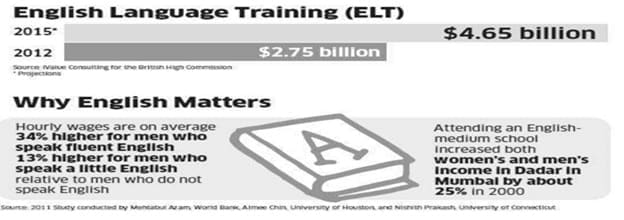Dr.V.K Batra
Mrs. Parvin Batra
Skills Development Experts
Global Competence, Panipat, Haryana
Educators, Consultants, Trainers and Auditors
The Employment Commission of India in the report The Challenges of Employment in India laid heavy stress on the issue of Skills Development in India and pointed out that serious action has to be taken in this regard. The Govt. of India has resolved to train 500 million people by 2022 in the Employability Skills including English. As a result Govt. of India has formed National Skills Development Corporation to identify skill gaps and to promote skill development in India
Why English Matters?
English Edge: ‘Earn 34% more than others’
Those who speak English fluently earn up to 34% more than those who don’t speak the language, a recent report has found, confirming the link between an education in English and the scope of employment opportunities.
“Men who speak English fluently earn wages about 34% higher and men who speak a little English earn wages about 13% higher than those who don’t speak any English,” the report said.
According to the report, only 20% of the Indian population can speak in English, and only 4% would be considered fluent. Where one lives is a key determinant in accessing English medium education, it found.
“Politicians who don’t like English are captains of a sinking ship. Higher education in English helps us get better integrated into the globalized organized sector and labour market. Those without access to higher education in English are being left out,” Dr Shariff told TOI.
Source:Times of India dated 06/01/14
The Book ‘Future of English in India’, and Research by World Bank and The Florida and Connecticut Universities reveals that 13% to 34% increase in wages results with better communication in English. In each Metro Like Mumbai, Bangalore, Delhi etc. almost 500 centres train Nurses, Drivers, Peons, Courier Agents and House Maids in English for Higher Wages.
Lack of the English Language knowledge is a bottleneck in both Admission & Placement in Technical & Professional Colleges all over the Country. Those, who have good communication skills are readily selected in Campus Interview at high pay packages than those who lack communication skills. Undergraduates & Graduates with good English easily get jobs at BPO’s and Banks.
The Film ‘English Vinglish’ proves how housewives can upgrade their status in the family by learning a few communication skills
Source: ET, July-Aug. 2013 article ‘No Full Stop in India’
ENGLISH IN THE WORKPLACE
A problem faced by any general-purpose ‘English for the workplace’ training course is that job-related skills are often specific to context. Each work sphere has its own special requirements with regard to communication for example
- there may be particular kinds of reports or forms to be filled in,
- or perhaps interactions with customers need to conform to a corporate policy.
For these reasons, Workplace English training is best carried out using materials taken from the workplace itself. In India the main focus seems now to be on the idea of ‘English for employability’, but there is equal importance of English skills in career progression.
Many of the better universities now provide co-curricular courses in English communication and in soft skills to ensure that their graduates are employable. The larger employers are also working closely with the universities and colleges which supply their new recruits. But many colleges do not provide such courses, or do not have the qualified staff to do so. This forces students into private sector ‘finishing schools’ to bridge the gap
Larger Indian businesses are already partnering with government departments to help improve the English and employability skills of both students in colleges and those in Class 10–12. The Delhi branch of the Confederation of Indian Industry (CII), for example, worked with the Municipal Corporation of Delhi to implement a pilot programme in Delhi schools. Many large companies have similar relationships with local colleges, helping ensure that students acquire communication skills before they graduate.
Much of the ‘talent pool’ crisis in India at present relates to the number of graduates who apparently lack ‘employability skills’. NASSCOM, the IT-BPO industry organisation, complains about the ‘low employability of existing talent with only 10–15% employable graduates in business services and 26% employable engineers in technology services’.
Employability skills
Employability Skills can be defined as the transferable skills needed by an individual to make them ‘employable’. Along with good technical understanding and subject knowledge, employers often outline a set of skills that they want from an employee. These skills are what they believe will equip the employee to carry out their role to the best of their ability.
What do Employers want?
Although most jobs in the corporate sector now require English, many of the ‘soft skills’ which make graduates employable are not language specific.
Skills That Employers Want
- Communication and interpersonal skills,
Can you explain ideas patiently and clearly?
Can you handle telephone calls well?
Can you communicate appropriately to other employees who may be more or less senior?
- Problem solving skills
Are you an analytic but creative thinker?
Have you a confident, polite manner?
- Using your initiative and being self-motivated
Can you work on your own, without being told to do so?
- Working under pressure and to deadlines
Can you handle stress that comes with deadline?
- Organisational skills
Are you punctual and dressed appropriately?
- Team working
Can you work in a team?
- Ability to learn and adapt
Are you able to learn new technologies and business processes quickly?
- Numeracy
Are you familiar with standard office software?
Are you able to use data and mathematics to demonstrate a point?
- Valuing diversity and difference
Can you communicate well to speakers from another culture or social background?
- Negotiation skills
Can you make clear presentations to colleagues?
Most workers in the services sector, whether in offices, BPOs, hotels or shops – need to communicate in at least two different directions:
to clients (whether in India or abroad) and within the chain of management (both up and down, and with peers) in their own organisation. Here workers may require:
- both spoken and written English language skills
– can you tell the difference between a manager’s request and an instruction?
- knowledge of specialist terms within the trade, profession, organisation or relating
During 6th Global Skill Summit, held at FICCI, N. Delhi it was brought to the notice of Mr. R C M Reddy (Chairman FICCI Skills Development Forum) that along with the Employability Skills, 5 basic Life Skills are also very important at school level therefore employability skills are to be preceded by life skill based education, but it is pathetic to find that students are qualifying +2 levels even when they don’t know the basic vocabulary and Grammar basics like proper paragraph writing, letter, application & resume writing.
Global Competence has conducted various experiments in Management & Technical Institutes by giving input regarding Communication Skills & facilitated in the successfully placement of B.Tech Textile Engineering students from Panipat , for placement in the Textile Corporate Sector like Nahar, Vardhman and Aarti groups in Ludhiana. We have interviewed 100 of candidates personally to find that only 5 % of the candidates could communicate in English which was a basic requirement in the Home Textile exports industry of Panipat which has more than 3000 crores of direct exports out of Rs 11000 crores of textile industry production from Panipat textile cluster. This supported by the facts published by various sources at national & international level.
Bibliography:
KP Narayan Kumar & Others No Full Stop in India The Economic Times Magazine
David Graddol English Next India British Council 2010



